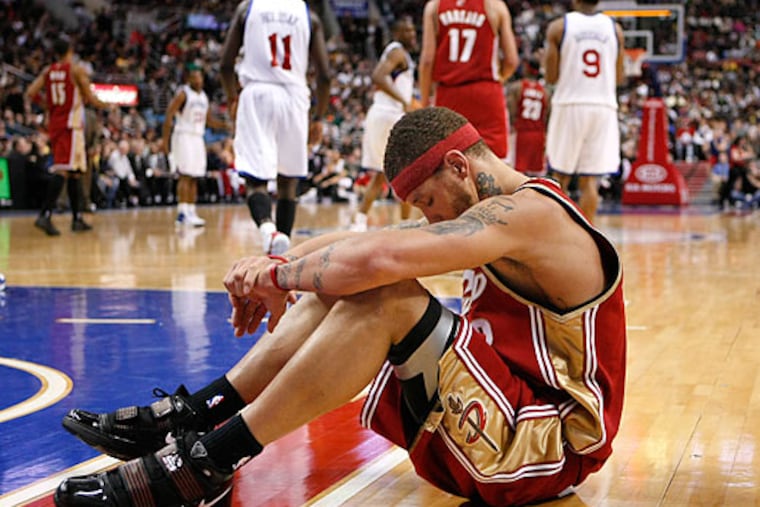After troubling video of former NBA player Delonte West, a look at Sixers who have spoken out about mental health
A video showing former St. Joesph’s and NBA player Delonte West being beaten up and placed in handcuffs on the street went viral Monday night, sparking conversations about what the NBA should be doing about former and current players’ mental health.

A video showing former St. Joseph’s and NBA player Delonte West being beaten up and placed in handcuffs on the street went viral Monday night, sparking conversations about what the NBA should be doing about former and current players’ mental health.
The video shows West, who first disclosed his struggle with bipolar disorder in 2009, rambling incoherently about being approached by someone with a gun.
Former college teammate Jameer Nelson urged followers on social media to show restraint when sharing the video, writing in a lengthy statement on Twitter that “Mental illness is something that a lot of people deal with and don’t even know it, until sometimes it’s too late.” He also said that he hopes his former teammate can get the help he needs. Former St. Joe’s coach Phil Martelli called the video “so very painful,” saying on Twitter that he has reached out to his basketball network to get West help.
The NBA adopted a new rule this year, requiring each team to make at least one full-time licensed mental-health professional available to players, as well as a psychiatrist when needed. Teams must also have a “written action plan” in case of mental health emergencies, and management must tell players and staff how the team will go about ensuring privacy and confidentiality.
These changes, coupled with a number of high profile players sharing their personal struggles, have helped the NBA garner a reputation as the most proactive professional sports league in efforts to eliminate stigma surrounding mental health. And it’s no surprise that Sixers players — past and present — have contributed to the conversation. Here are a few of the most vocal Sixers about the importance of addressing mental-health issues.
Josh Richardson
The shooting guard admitted that after being traded from the Miami Heat to the Sixers this summer, his mental health was in a “hole.”
“It’s one of those things you constantly have to think about," Richardson said in an interview with NBC Sports Philadelphia. “You have to consciously stay on your mental health, because if you don’t, you can look up and you’re depressed or you’re just not in the right state of mind. I’ve seen guys succumb to that. It’s tough to dig yourself out of that hole. I was there, to be honest. I was there this summer for a while. I got a therapist and I’ve been trying to work that out.”
Tobias Harris
Harris has said in media reports that he practices bikram yoga, which is performed in a room heated to 95 to 108 degrees with 40% humidity, to meditate and increase awareness of his “own inner personal being.” Last July, Harris led a two-day wellness event in New York as part of the inaugural Tobias Harris Healthy Lifestyle Conference.
“Physical health and mental health go hand in hand. Every day I wake up and go work out, and it’s not because I have to do it, it’s because it’s good for my own well-being as a person to be able to get up and move every day," he told NBC Sports Philadelphia.
Harris also said that he appreciates how attitudes surrounding mental health in men’s professional sports have become more open, so that men feel more comfortable to get help when they’re struggling. Today, he sees a therapist in addition to his yoga practice.
Robert Covington
After former Sixer Covington was traded to the Timberwolves in 2018, he injured his knee during a New Year’s Eve game and had to sit out the rest of the season. This was a stressful and frustrating experience, he said.
“I was just in a state of frustration, state of stress. It made me get to the point where I had to send my family away from me, just because I couldn’t put them through that energy that I was feeling up top," he told SKOR North, the ESPN radio affiliate for the Minneapolis-St. Paul area. "Like I wasn’t myself, I’d be walking around with my head down, caught in my thoughts, not being the person that I am right now — the energetic guy that’s uplifting, that’s motivating, I wasn’t that person.”
Jahlil Okafor
When former Sixer Okafor prepared for his debut with the New Orleans Pelicans in 2018, he posted on Instagram that he had learned to identify and manage his sources of stress. Okafor said that “mental-health awareness is a cause I will fight for, the rest of my life” and encouraged those who were struggling to seek help.
Royce White
White, who was with the Sixers in 2013, has been outspoken about his generalized anxiety disorder (GAD) since before he was drafted in 2012 by the Houston Rockets. He is one of the most vocal critics of how mental-health issues are treated within the NBA. He publicly advocated for a comprehensive policy for all players.
“As a society, we must find and commit to ways of supporting people who are struggling and simultaneously help them thrive. We must do this with immediacy,” White wrote for his blog, The Last Renaissance. “That effort starts with genuine care, being more honest about our true nature and our ability to choose past that nature, and redefining our goals to create better standards. Hopefully, that will begin to transform a culture of rabid distrust into one that’s more transparent. This is no easy task, but certainly a necessary one.”